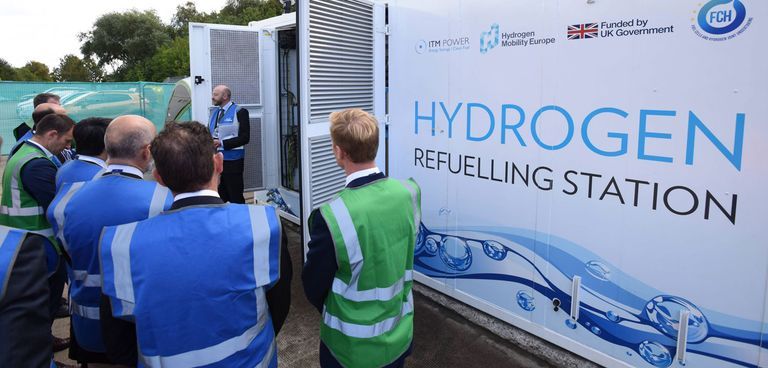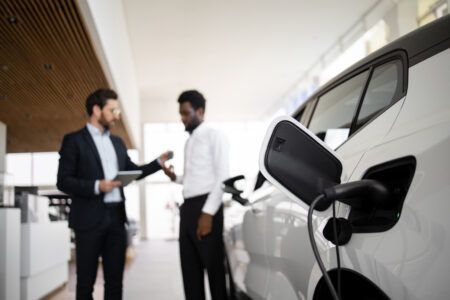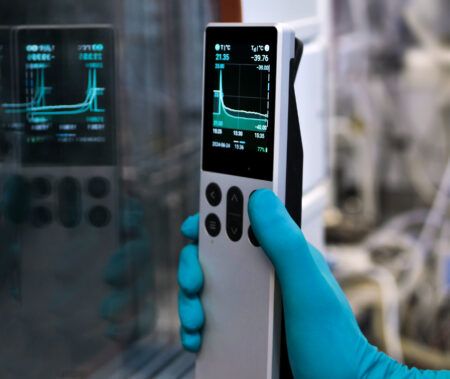Energy systems are evolving to incorporate new clean technologies and research is already underway to prepare for the potential opportunities and challenges. This is demonstrated by projects like InTEGReL, the UK’s first incubator for integrated energy system technologies, and Northern Powergrid’s Customer-Led Distribution System (CLDS) project, which puts its eight million customers at the heart of the smart grid future.
To discuss the potential hurdles in the transition to a smart energy future, Northern Powergrid brought together industry leaders from academia and business for an exclusive roundtable on the specific challenges surrounding the decarbonization of transportation.
The panel features: Patrick Erwin, policy and markets director, Northern Powergrid (below, second right); David Gill, head of customer energy solutions at Northern Gas Networks (second from left); Professor Phil Taylor, head of engineering and deputy pro vice-chancellor of Faculty of Science, Agriculture and Engineering, Newcastle University, and director of the EPSRC National Centre of Energy Systems Integration [CESI] (right); and Chris McDonald, CEO, Materials Processing Institute (left).

Behavior change will be necessary to support the decarbonization of transportation. This is notoriously difficult, so how can this be achieved?
Chris McDonald: Innovators must recognize that running with the grain of current behaviors will always accelerate the adoption of technology and so the real prize is to achieve decarbonization in a way that keeps behavioral changes to an absolute minimum.
Phil Taylor: Yes, Chris’s observation reflects the two major schools of thought on how behavior change can be achieved for transportation. The first suggests we should try to make change invisible to the consumer. This is the approach of hydrogen car manufacturers as the refueling process is similar to the fossil fuel vehicles we use today.
The second school of thought suggests making the change beneficial to the consumer. The huge reduction in cost-per-mile is advantageous for EVs and the ability to charge at home or work versus visiting petrol stations is much more convenient.
Patrick Erwin: Yes, and new technologies are also becoming available that encourage behavior change. We’re running a project with GenGame, which is demonstrating how a simple mobile game could become an important tool to help balance the grid. With cash prizes of up to £350 (US$460) up for grabs, early results are promising, suggesting the average household reduces energy consumption by 11%.
David Gill: Interesting, but when it comes to transport, if EVs are the only solution, then customer behavior must change. But such a single-form strategy may introduce risk to the UK in terms of its comprehensive reliance on electricity, something we currently do not have.
So, a diversified portfolio of solutions will be necessary to provide versatility and reduce the need for behavior change. Compressed natural gas (CNG), for example, allows us to reduce emissions from HGVs and buses. It’s cleaner than diesel and contains less particulate matter.
 What opportunities are there with the electrification of transportation? What about hydrogen?
What opportunities are there with the electrification of transportation? What about hydrogen?
PE: National Grid predicts that there could be as many as 36 million EVs on British roads by 2040. This is a huge opportunity for investors, innovators and industry to collaborate to drive this change. There is also a significant opportunity for us to use the batteries in these vehicles, through vehicle-to-grid systems to provide flexibility services and maximize network bandwidth.
DG: Yes, and to add to that, a hydrogen gas network can support decarbonization of transportation. Hydrogen offers huge potential for decarbonizing cars, HGVs and diesel trains.
For the haulage fleets undertaking long journeys, CNG offers a cleaner alternative to diesel that can make a difference to air quality while reducing range anxiety for HGV fleets.
CM: I find the lack of attention on hydrogen, versus electrification puzzling. In many ways, a hydrogen economy could be a successful mimic of the oil-based economy, just without the carbon. This would also minimize behavioral change.
PT: Electrification of transport can lower carbon emissions, provide better air quality and quieter vehicles. It also allows us to take advantage of the UK’s growing renewable electricity generation. The fact that the UK hosts Europe’s largest EV battery manufacturer – Nissan – also proves we can also support jobs and industry.
While most hydrogen is produced using fossil fuels, it certainly has a role to play if this challenge can be met. InTEGReL will investigate this in detail.
How can the government support? What regulation might be useful?
CM: The best way for the government to support the hydrogen economy, is to help create the market by promoting the transition. With the market in place, private industry will have the confidence to fill the space.
PE: The ban of all new ICE cars post-2040 certainly makes a strong statement. However, I think that in order to ensure the new fleet of EVs is powered by clean energy, we must also have policy that supports renewable energy.
PT: I can think of six ways this can be done:
1. Legislating for ultra-low emissions vehicles to be introduced, penalizing highly polluting vehicles.
2. Providing detail on how the tax burden will be switched from the current model of diesel/petrol duty.
3. By outlining who will pay for the required electric/hydrogen vehicle charging infrastructure.
4. Ensuring that road users are educated to the merits of switching.
5. Leading by example – switching the public sector to ultra-low emission vehicles wherever practical.
6. Encouraging traditionally siloed industries to collaborate.
For example, aligning the gas and electricity networks’ regulation funding cycles will encourage collaboration that benefits both sectors as well the consumer.





